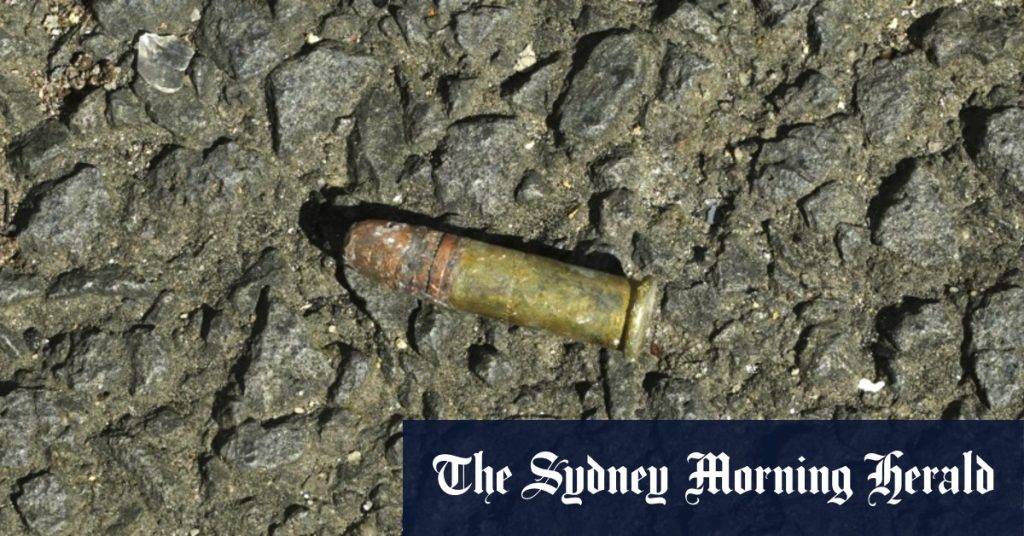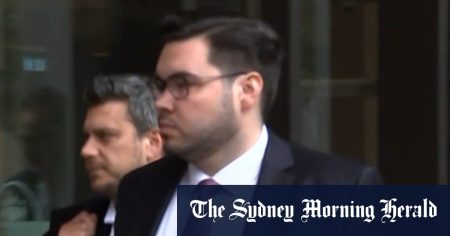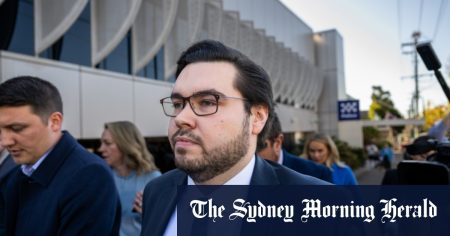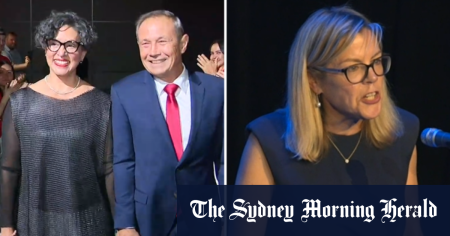The Adass Israel synagogue in Ripponlea, Melbourne, was severely damaged by a firebombing, leaving the community devastated and raising concerns about rising antisemitism. Images revealed the extent of the destruction, depicting a gutted building with charred remains, tangled wiring, and a collapsed roof. Police, including the Counter Terrorism Command, launched an investigation and increased patrols in the area, though details about the investigation’s progress and additional security measures remained scarce. The incident occurred just before Shabbat, the Jewish day of rest, disrupting the community’s traditional observance.
Despite the tragedy, members of the Adass Israel congregation gathered for Saturday morning services at a temporary location in St Kilda East, demonstrating resilience in the face of adversity. Community members expressed their shock, anger, and fear, questioning why they were being targeted and lamenting the disruption to their lives and religious practice. Chani Goldberger, a regular attendee at the synagogue, voiced her distress, highlighting the impact on the community’s ability to pray, live freely, and feel safe. City of Port Phillip Mayor Louise Crawford echoed these sentiments, acknowledging the devastation, shock, and anger within the community, while also noting that some members, unfortunately, were not surprised given the recent rise in antisemitism. Crawford emphasized the importance of supporting the congregation, finding a new space for worship, and fostering unity.
The firebombing prompted increased security measures at other nearby synagogues. Demonstrations of support emerged from various quarters, including Aamer Chida, a Muslim man who brought flowers to the synagogue to express solidarity with the Jewish community. He condemned the attack as disrespectful and emphasized the importance of respecting places of worship. The incident resonated internationally, with Israeli Prime Minister Benjamin Netanyahu linking the attack to Australia’s recent vote in favor of a UN resolution critical of Israel and its refusal to grant a visa to a former Israeli minister. However, Mayor Crawford disagreed with this assessment, believing that Australian policymakers were actively working to de-escalate tensions and promote peaceful coexistence.
Victorian Roads Minister Melissa Horne, speaking on behalf of the state government, declined to comment directly on Netanyahu’s remarks but highlighted the government’s commitment to combating antisemitism, citing strengthened anti-vilification laws and increased police patrols. She reaffirmed the government’s readiness to take further action as needed. Within the local Jewish community, long-time resident and Labor Party member Henry Pinskier expressed deep concern about the rising tide of antisemitism in Melbourne, criticizing both state and federal governments for what he perceived as a lack of effective action. He called for stronger consequences for acts of antisemitism and urged authorities to uphold and enforce the law.
Pinskier drew parallels between the current climate and historical instances of antisemitism in Europe and Russia, emphasizing the vulnerability of the post-Holocaust community that had sought refuge in Australia. He expressed dismay that his 98-year-old mother, who had fled persecution in Europe, was now witnessing a resurgence of antisemitism in Australia. Liberal MP David Southwick labeled the attack an act of domestic terrorism and accused the Labor government of allowing hatred to fester and become normalized. He stressed the government’s primary responsibility to ensure public safety and argued that both state and federal Labor governments had failed in this duty.
The firebombing of the Adass Israel synagogue serves as a stark reminder of the ongoing threat of antisemitism and the need for vigilance and decisive action to combat hate crimes. The incident sparked a range of responses, including expressions of solidarity, calls for increased security measures, and debate about the underlying causes and appropriate government responses. The community’s resilience in the face of this attack underscores the importance of supporting and protecting vulnerable groups and fostering a climate of tolerance and respect. The investigation into the firebombing remains ongoing, and the long-term consequences for the community and the broader societal implications are yet to be fully understood.
The immediate aftermath of the attack highlighted the community’s resilience and the outpouring of support from diversos sectors of society. While some members expressed shock and disbelief, others conveyed a sense of resignation, having anticipated such an act given the perceived rise in antisemitic sentiment. The incident prompted calls for unity, greater interfaith dialogue, and stronger measures to combat hate crimes and protect vulnerable communities. The attack also spurred a debate about the role of political rhetoric and its potential impact on exacerbating societal divisions. The community’s commitment to rebuilding and continuing their religious practice underscores their strength and determination in the face of adversity.
The incident also highlighted the complex interplay between local and global issues, as exemplified by the differing interpretations of the attack’s significance. While some connected it to broader geopolitical tensions related to the Israeli-Palestinian conflict, others viewed it primarily as a manifestation of local antisemitism requiring local solutions. The varied perspectives underscore the challenges in addressing such complex issues and the need for multifaceted approaches that consider both local and international contexts. The incident also prompted discussion about the responsibility of governments to protect their citizens from hate crimes and to foster an inclusive society where all communities feel safe and respected.
The long-term impact of the firebombing on the Adass Israel community and the wider Jewish community in Melbourne remains to be seen. The rebuilding process, both physically and emotionally, will undoubtedly take time and require substantial support. The incident serves as a wake-up call to address the root causes of antisemitism and other forms of intolerance and to strengthen community resilience in the face of such threats. The ongoing investigation and subsequent actions taken by authorities will be crucial in determining the course of justice and the broader societal response to this act of violence.
The firebombing also raises broader questions about the nature of hate crimes and the societal factors that contribute to them. It underscores the need for continued education and awareness-raising efforts to combat prejudice and promote understanding and respect between different communities. The incident also highlights the importance of fostering interfaith dialogue and building bridges between different religious groups to counter divisive narratives and promote peaceful coexistence.
Finally, the firebombing of the Adass Israel synagogue stands as a testament to the enduring strength and resilience of the Jewish community in the face of adversity. Their commitment to rebuilding, continuing their religious practice, and seeking justice serves as an inspiration to all who strive for a more tolerant and inclusive society. The incident reminds us of the ongoing need to combat hate and prejudice in all its forms and to work towards a world where all communities can live in peace and security.










